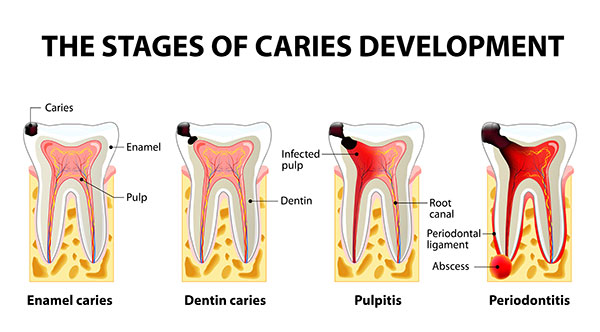Root canal treatment, also called endodontics, is performed when very deep decay infects the blood vessels and nerves of a tooth. To carry out this treatment, root canals are accessed with the aim of extracting the nerves damaged by caries and cleaning them to avoid new infections.
Root canal treatment belongs to conservative dentistry, since sometimes it is the last chance to save the tooth before the infection becomes more serious and the extraction of the piece is necessary.
At Chagger Dental, we understand that root canals can be an intimidating experience. We strive to make the process as smooth and stress-free as possible for our patients.
Our dentists will take the time to explain the procedure to you and answer any questions you may have. We also offer sedation options that can help you feel comfortable and relaxed during the procedure.
Steps to follow in a root canal:
- Diagnostic radiography. It allows to see what the ducts are like, their shape, length, calcifications, etc.
- Local anesthesia.
- Isolation of the tooth. Use of a rubber dam.
- Opening of the pulp chamber to reach the canals. Sometimes it is used as an emergency treatment since it reduces pain.
- Instrumentation and cleaning of root canals with conductometry. It consists of the measurement and radiological verification of their length.
- Obturation and hermetic sealing of root canals.
- Final radiograph.
When is it necessary to do a root canal?
Endodontics or root canal treatment is also popularly known as “killing the nerve”. It is done in the following cases:
- The affected tooth has deep caries. Bacteria penetrate the dentin and reach part or all the pulp.
- Dental trauma: The breakage of a tooth by a blow can directly expose the pulp tissue and make its removal necessary. Trauma can interrupt the vascular supply of the tooth and lead to necrosis of the pulp or loss of vitality of the tooth.
- tooth erosion. The wear of the tooth surface due to mechanical causes (bruxism) or chemical causes (bulimia, consumption of acids, etc.) can sometimes become so intense that it affects the interior tissues of the tooth.
- Exceptionally, it may be necessary for periodontal reasons (endo periodontal lesions) or prosthodontics.
When is a root canal treatment performed?
A cavity by itself does not constitute a danger to our dental health. However, if we let it continue to progress without treating it, the infection will reach the innermost part of the tooth: the pulp cavity, where the root canals and nerves of the tooth are located.
Some symptoms that reveal that the pulp has been affected by caries, and therefore we need a root canal treatment, are:
- Intense and constant pain when eating very cold or hot food. The dental pulp oversees perceiving sensory stimuli; therefore, if it is damaged, we will perceive a sharp pain.
- Change of color or darkening of a dental piece. Generally, a tooth acquires a gray color when the pulp loses vitality.
- Inflammation of the gum around the decayed tooth and even the appearance of dental fistulas (inflammation or lump with pus).
If you have had a cavity for a long time and notice any of the symptoms mentioned, go to the endodontist to solve the problem as soon as possible.
In case of severe trauma, the pulp may be damaged by the blow. In these cases, this treatment may also be necessary.
How is a root canal treatment performed?
The specialist must verify through radiographic tests that the nerves are damaged by caries. In case it is too late, and it is necessary to remove the piece, the patient can choose to have a dental implant placed to restore their functions.
However, whenever possible it is preferable to preserve the natural teeth. For this, root canal treatment is the best solution in these cases.
This procedure is performed under local anesthesia, to prevent the patient from feeling pain during the process. Depending on the type of tooth, there may be one or more infected canals. Once the area is anesthetized, a small incision is made through the crown -or accessed through the cavity- and disinfection is carried out.
When the pulp has been extracted, the root canals are cleaned and filled with biocompatible material. Finally, the dental crown is reconstructed to minimize aesthetic repercussions.
It is possible that the patient feels dental sensitivity during the days following the treatment. Root canal treatment is very effective but see your dentist if the pain persists for several days to make sure there is no additional problem.
Care after a root canal:
After undergoing a root canal, it is advisable to follow a series of guidelines:
- Wait for the effect of the anesthesia to finish to start chewing. This way we will avoid biting each other.
- Do not chew hard foods during the time between the root canal and the final reconstruction of the tooth.In this way we protect the tooth from possible unwanted fractures. Once the final reconstruction is done, you can resume normal chewing.
- Be careful with dental floss. Dental hygiene after a root canal should be just as rigorous as usual. As for the dental floss, we must pass it with special attention between the provisional reconstruction (if any) and the adjacent tooth. The intention is not to cause the deterioration or collapse of the reconstructed area.
- Analgesic-anti-inflammatory medication. The days immediately after the endodontics you can notice a certain sensitivity in the area. You can even feel discomfort of varying intensity depending on where the inflammation reaction occurs. The periapical zone (tissue that surrounds the end of the root) is one of them. To alleviate symptoms after endodontics, analgesic-anti-inflammatory medication prescribed by the dentist should be taken.
- Treatments such as internal whitening, aesthetic reconstructions, veneers, or crowns may be necessary over time (months or years). They will allow us to solve aesthetic problems. The change of color with respect to the natural tooth, derived from the loss of vitality of the tooth is one of them.
The endodontic specialists at our clinic summarize the care that must be followed a root canal as follows: “Take the prescribed analgesic, anti-inflammatory or antibiotic medication, and avoid any type of hard food in the area until the definitive reconstruction is finished”.
Root Canal Cost in Ontario:
Root canal cost in Ontario varies depending on the severity of the case and the complexity of the procedure. The cost of a root canal in Ontario can range anywhere from $400-$800.
However, it is important to note that some root canal procedures may cost more, depending on the complexity of the case. Additionally, you may incur additional costs for follow-up visits, X-rays, and other services.
Chagger Dental Root Canal Services:
At Chagger Dental, we offer a range of root canal services to help restore your dental health. We take a comprehensive approach to care, offering a range of treatments to meet your individual needs. Our experienced team of dentists, hygienists, and specialists use the latest technology and techniques to provide the highest quality of care. We offer root canal treatments for a variety of conditions, including infection, decay, and fracture.
We also provide treatment for complex cases, such as root canals with multiple canals, that require special attention and expertise. In addition, we offer several options for restoring teeth after root canal treatment, such as crowns, bridges, and implants. Our goal is to provide you with the best care possible and help improve your dental health.

